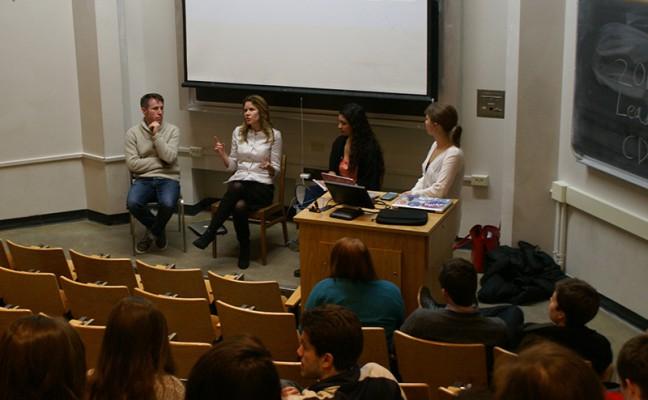Concerned with Gov. Scott Walker’s proposed budget cuts and its affect on the quality of education and recruitment at University of Wisconsin, the College Democrats held a forum Thursday.
Rep. Chris Taylor, D-Madison, Donald Moynihan, UW professor of public affairs, and UW student Jessica Franco-Morales each gave their takes on the situation students face.
“From a faculty perspective, there is a tradeoff between quality of education and budget cuts,” Moynihan said. “The more you cut the lower the quality.”
Faced with the proposed $300 million budget cut, the panelists agreed it would have negative effects on the UW experience. Moynihan said students will face a reduction in the overall quality of education as programs are cut and new professors are wary of joining the UW System.
What is so “boggling” is that the university itself is fueling the economy of the entire state, yet is getting the brunt of Walker’s cuts, Taylor said.
“This university is the economic engine of this state, the whole system is driving the economy,” Taylor said.
With these consistent cuts, it is hard for UW to remain a top-notch university, Taylor said. These cuts not only call for a reduction of programs, but also dissuade professors from coming or staying at a university that is constantly being hit with more cuts, Taylor said.
Yet it isn’t just the quality of education that is at risk in face of such cuts. Franco-Morales and Moynihan said creating more diversity on campus would also be hindered.
“One aspect of diversity, from a practical point of view, is diversity costs money,” Moynihan said. “There are a lot of universities chasing those students so you need more resources.”
With the impending budget cuts, the resources available at UW will be limited, attracting fewer gifted students of color to an already predominantly white university, Franco-Morales said.
Under public authority, the statute that requires recruitment programs for students of color will be struck, Franco-Morales said.
“Wisconsin is a very white state; we go to a predominantly white institution,” Franco-Morales said. “If the university already thinks we go above and beyond the minority requirements, then I wonder what will happen when the requirements are struck.”
Franco-Morales said these cuts will affect students who are already being marginalized. Without a strong legal requirement, it is hard to have faith in only the word of the university to continue such programs contributing to a more diverse campus, Franco-Morales said.
While facing these issues, it is important to understand that the efforts to gain support against these cuts should not end in Madison, Taylor said. To make a difference and avoid further negative impacts upon the campus, students need to get involved and contact people across the state for support, she said.
With education on the line, it is important to bridge the gap between policy makers and campus, Taylor said.
“I think as students, it is critical that you make contact with your elected legislators, you need to pick up the phone and contact those who represent your hometown,” Taylor said. “Your voice matters, your activism matters.”














